Not all weed killers are created equal or have the same purpose. Some prevent seeds from germinating, others kill established plants. Some are organic and pet/child safe, and others require plenty of caution when you’re using them.
In this guide, we’ll give you plenty of advice on finding the right weed killer for your garden, what different types of weed killers are, and how to use them safely – along with our top 9 best weed killers.
More...
Top Pick

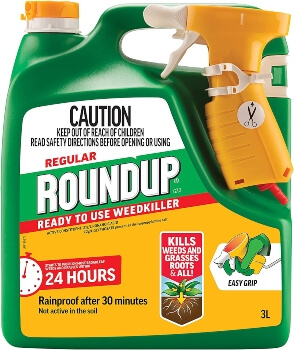
Best Value

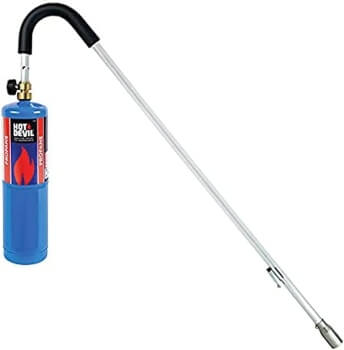
9 Best Weed Killers for 2025
Product | Our Rating | Price | |
|---|---|---|---|
1. Roundup Regular 24H Weed Killer Spray | 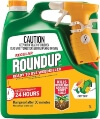 |  | |
2. HOT Devil Super Weed Killer | 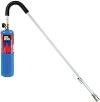 |  | |
3. Lawn Builder Weed, Feed and Green Up | 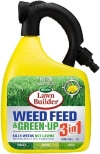 | ||
4. Richgro Beat A Weed Natural Weedkiller | 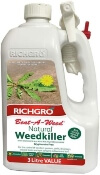 | ||
5. Yates Zero Bindii Clover Weeder | 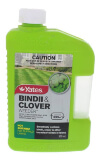 | ||
6. Dicamba M Selective Herbicide Weed Killer |  | ||
7. Richgro Tree, Blackberry and Woody Weed Killer | 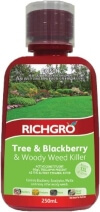 | ||
8. NEW Weedout - No Glyphosate, Natural Organic WeedKiller | 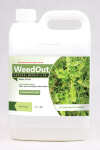 | ||
9. Brunnings Extra Strength Feed 'n Weed | 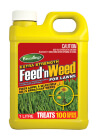 |
Different Types of Weed Killer
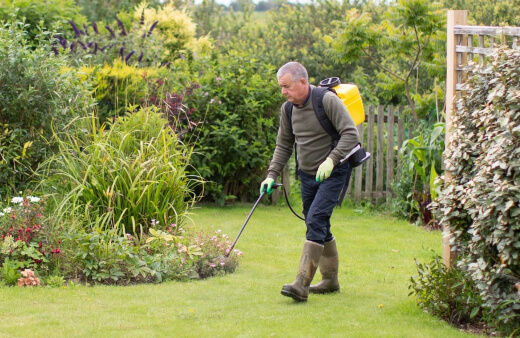
These are the two main types of weed killer:
Pre-Emergent Weed Killer
This is for killing weeds before they start to grow, preventing seeds from growing by stunting root growth in the very early stages of germination.
Pre-emergent herbicides should be used in very early spring to be effective, as they won’t harm plants that already have an established root system.
This means it’s safe for your lawn and flower beds, but shouldn’t be used near any other new seeds.
Post-Emergent Weed Killer
A post-emergent herbicide is one that kills established, growing weeds. This will only be effective on weeds you can already see. And what we suggest when dealing with winter grass.
You can use them any time of year, but be careful not to let the spray or granules come into contact with your lawn or established plants, as it will kill them too.
Weed killers are also categorised by how they work:
Contact Weed Killer
This will kill off any plant it comes into physical contact with, wilting and killing weeds very quickly. You’ll usually start to see results within an hour or so.
They tend to destroy the foliage of the weeds without affecting the root system. This can kill lighter weed growth, but usually means reapplying the weed killer several times to properly kill more established weeds.
Contact weed killer should be used on annual weeds that spread via seeds.
Systemic Weed Killer
These weed killers work by being absorbed by the leaves of the plant and entering the root system, stopping the plant’s ability to get nutrients from the soil. They work more slowly, and you’ll see results in 1-3 weeks.
This is highly effective on perennial weeds that spread through seeds and the soil. Some weed killers are both systemic and contact, and these will usually be marked as general-purpose or all-rounder weed killers.


Get Your Free Guide:
Master Growing Australian Natives eBook
A Must Have Complete Guide for Every Australian Garden
Get Your Free Guide:
Master Growing Australian Natives eBook
A Must Have Complete Guide for Every Australian Garden
What are the Best Weed Killers for Lawns?
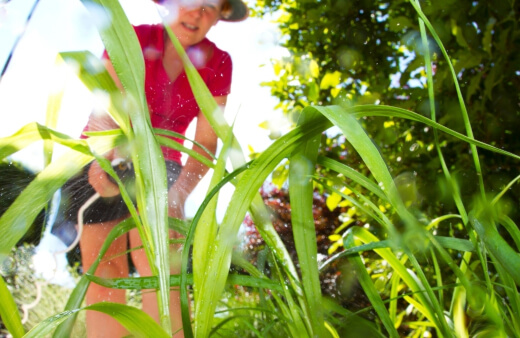
There are several options for killing weeds in lawn:
- Manual – Manually digging out weeds by hand, using a fork or weed puller.
(Should you decide to go for the latter, see our weed puller product reviews and buying guide.) - Pre-emergent weed killer – This will kill weeds before they start growing without affecting established plants and grass. However, it will affect newly sown grass seed.
- Post-emergent weed killer – Although this will kill the grass as well as the weeds, it’s a good option if your lawn is overgrown with weeds and you want to replant that section.
Why is a the best option for weeds in your pavement?
The reason why I recommend using a weed killer to control the weeds in your paved area’s is actually different to why it is useful on large scale gardens.
Simply put, weeds can have very strong root systems and generally speaking, when you try and remove weeds from between pavers, the roots often break off. If you don’t remove the root system, often the weeds can simply just grow back.
The weed killers reviewed below not only kill the root system but will also make it easier to pull the whole weed out after the weed has died.
How Do You Stop Weeds from Coming Back?
This is a gardener’s biggest challenge! Unfortunately, weeds continually get into our gardens from passing birds and wildlife, blown in from other gardens, or even on the soles of our shoes. Luckily, there are some things you can do:
- Keep your existing weeds under control with a post-emergent weed killer
- Use a pre-emergent weed killer in the very early spring before weeds start growing
- Pull out any weeds you do see, especially if they are seeding. Be very careful and dispose of them in your garbage, not your compost.
- Boost your garden’s health by planting native plants, mulching your lawn and flowerbeds, and feeding your plants with the right fertiliser. The stronger your existing plants are, the harder weeds will have to work to establish themselves.
How to Use Weed Killer Without Harming Wildlife
Some weed killers are very harmful to native ecosystems, wildlife and human health, especially those that are high in glyphosates. Glyphosates are just as harmful to humans too.
If you do need to use a strong glyphosate weed killer, be careful to use it sparingly and avoid pollination times in spring and summer, as this can kill bees and other beneficial insects.
Organic, Pet/Child Safe and Natural Weed Killers
If you have children and pets or are concerned about the natural environment (as we all should be), we recommend that you use a weed killer that is pet safe, child safe, and organic.
In addition to buying these weed killers, you can also try these safe weed removal methods:
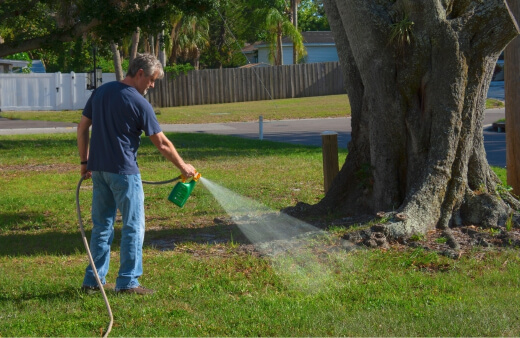
- Physical removal – This is the safest but most physically-demanding way of removing weeds. If you don’t have many weeds, and you don’t have back pain, this is a good option. Use a small garden fork to dig down and remove the entire weed with the roots.
Try to spend time doing manual weeding in early spring before the weeds develop seed heads and remember to wear sun protection. It can also help to work when the ground is damp. - Boiling water – You can effectively kill any type of weed or plant by pouring boiling water onto them. It’s completely safe for the environment, kids, and pets too, as long as you keep them away from where you are pouring and remember to protect your hands too!
A word of warning though, don’t allow any boiling water to splash onto nearby plants – it will have the same effect on them also. - Salt – Sprinkling weeds with salt or adding salt to boiling water will quickly kill weeds, and it’s great for clearing paving or driveways. If you plan to sow new seed or grow new plants in these areas, just flush it with clean water before you plant to clear out the excess salt.
- 5% vinegar – Vinegar that has an acetic acid level of 5% or more is a key ingredient in natural, organic weed killers. All you need to do is spray it onto the plant (a second dose may be required), and the weed should start to die quite quickly.
- Hoeing - is also a good way to remove weeds from garden beds. Just run your hoe through the bed ripping the weed out root and all. The weed can then lay in the garden and decompose adding to the soil’s structure.
If you are planning to use this method make sure you do it before the weeds flower. If it is flowering it may pay to remove it by hand and then discard in the bin or a hot compost pile. - Cornmeal – Corn gluten meal is a byproduct of the corn industry that has until recently only been fed to pigs and poultry. However, research has now shown that its qualities are far more beneficial than just feeding a herd of hogs.
Firstly, the NPK ratio of corn gluten meal is 9-1-0 which is perfect for lawns as a spring fertiliser. The boost of nitrogen will feed the grass and produce a flurry of dark green blades while the low levels of phosphorus will allow the lawn to grow without seeping out into our watercourses.
But that’s not where the benefits of corn gluten end. In fact, using corn gluten meal as a fertiliser is really a byproduct of this byproduct. The real beauty of this substance is its effectiveness at killing weeds without damaging your lawn or using chemical herbicides.
Corn gluten meal is a ‘pre-emergent’ form of organic weed control in that it dries out weed seeds before they begin to germinate and sprout. So, an application of corn gluten at the start of spring will see most of your lawn weeds (crabgrass, dandelions, barnyard grass, bindii, purslane and others) fail to grow while your lawn gets a head start.
(Read our in-depth guide on how to get rid of bindi weed for more details.)
An application of corn gluten meal will last as a weed killer between 4-6 weeks and can be reapplied after that. In fact, as a weed killer it has a cumulative effect and will build up in the soil and become even more a powerful form of organic weed control.
How To Eliminate Weeds Over Large Areas
Most manual methods only take into consideration small areas within your garden. If you want to eliminate weeds over a greater area try employing the use of the soil solarization method.
To do this place a large sheet of black plastic over the area and weigh it down with bricks, sand or even pieces of timber. Leave it in place for about 7-14 days and then remove the plastic.
The amount of heat that will have been built up will have eliminated most, if not all, of your weeds and possibly any seeds that were lying dormant on the top of the soil. You can dig the remains into the soil and after improving it you can plant almost straight away.
How to Apply Weed Killer
When using a weed killer, always follow the manufacturer’s instructions. Don’t be tempted to make the solution stronger if you have to mix it yourself, as this doesn’t make it more effective.
Always apply the weed killer on a dry day when rain is not expected for around 48 hours.
Be sure to wear protective coverings over your eyes, mouth and hands, and to remove pets and children from the area for the entire waiting period (usually a few hours) as specified by the manufacturer.
Best Weed Killer Reviews
1. Roundup Regular 24H Weed Killer Spray (Toxic)

Roundup Regular 24H Weed Killer Spray
There’s a good reason that roundup is the market leader in weed killers; they’re the best. Roundup has a massive range of products online, and all work well at their jobs, but good old-fashioned roundup regular should be a go-to weed killer for any gardener.
OK, so it’s not organic, but no weed killers are (none that work anyway).
Glyphosate is a horrible chemical. It stinks, it’s bad for your garden, and awful for wildlife, but if you use it responsibly on hot days, and don’t spray anywhere where wildlife will get to it before it dries up, it’s safe.
So use Roundup responsibly, and target it right at the leaves of the plants you want to get rid of. The only weed it won’t kill is marestail, the prehistoric pest plant that just won’t die!
However, it does help to weaken marestail as part of a regular routine that involves spraying, then pulling, then bruising the plant.
Pros
Cons
2. HOT Devil Super Weed Killer (Non-Chemical)

HOT Devil Super Weed Killer
When in doubt, kill it with fire. There is no weed in the garden that can survive being burned to its roots, so if you don’t like the idea of chemical weed killers, get a weed burner.
They need a little bit of practice, and patience is very much a virtue as the aim is to get right to the roots, and not just burn the foliage of weeds.
Some weeds, like marestail and bindii, will still regrow the following year, but they will be weaker, and fail to seed around. Regular burning prevents photosynthesis and the weeds will eventually just die.
For a wildlife-friendly approach, fire might not sound ideal, but it’s far safer in the long term as it doesn’t release any chemical pesticides or herbicides into the garden.
Pros
Cons
3. Lawn Builder Weed, Feed and Green Up (Toxic)
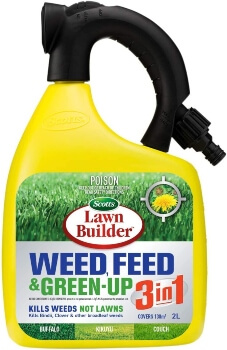
Lawn Builder Weed, Feed and Green Up
Lawn Builder specialise in lawn care products, so their 3in1 weed killer is ideal for gardeners who want that extra peace of mind when trying to remove tough weeds without harming their grass.
Like all weed killers, no matter their ingredients, it’s toxic and should be used sparingly and responsibly, but it’s an effective substitute for more potent general weed killers.
Pros
Cons
4. Richgro Beat A Weed Natural Weedkiller (Non-Toxic)
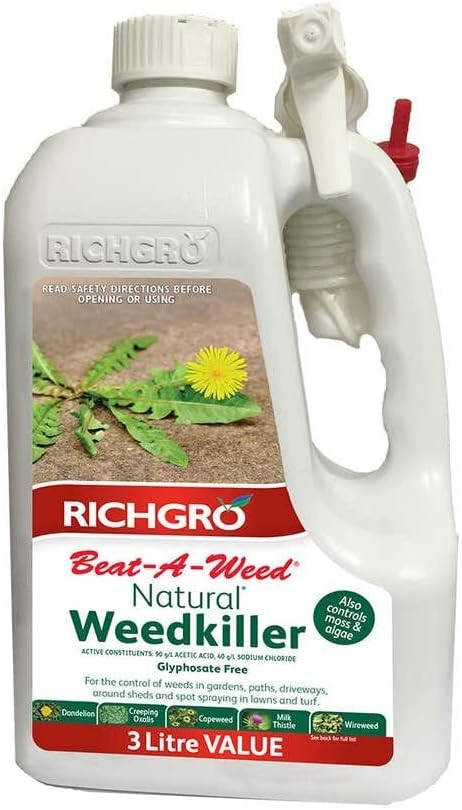
Richgro Beat A Weed Natural Weedkiller
This all-natural weed killer is a great choice for eco-friendly gardening, or if you have children and pets. It comes in a ready-to-use spray bottle, and can kill weeds, moss, and algae.
Tougher, more established weeds may need a second dose to completely kill them off.
Pros
Cons
5. Yates Zero Bindii Clover Weeder (Toxic)
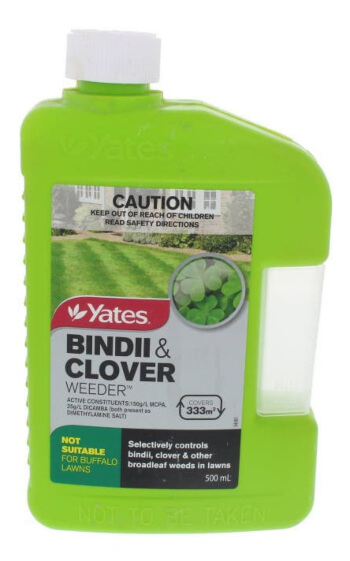
Yates Zero Bindii Clover Weeder
This is a broadleaf-specific weed killer for removing dandelions, clover, and bindii. By combining two types of weed killer, it’s effective on a wide range of weed types, and it’s very economical, with 500ml treating 330 square meters. As a systemic weed killer, it shows results within 4 weeks.
Pros
Cons
6. Dicamba M Selective Herbicide Weed Killer (Low Toxicity)
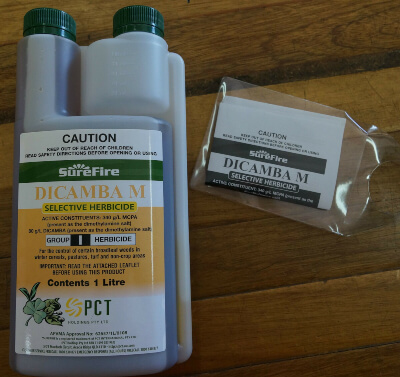
Dicamba M Selective Herbicide Weed Killer
This is a great weed killer for killing broadleaf weeds like bindii and clover, and it can be used safely on your lawn without killing your grass.
It’s low toxicity but still effective, and one litre can treat an impressive 1500 square metres.
Pros
Cons
7. Richgro Tree, Blackberry and Woody Weed Killer (Toxic)
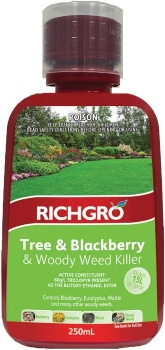
Richgro Tree, Blackberry and Woody Weed Killer
Woody weeds need specialist treatment. They can be deep-rooted and are very resistant to most foliar weed killers. Richgro’s Tree & blackberry weed killer focuses its energy on keeping right down to the roots of woody plants and is best used by painting it directly onto cut stems.
Stop digging roots out when there will be more to come, and attack the entire system with targeted action from Richgro.
Pros
Cons
8. NEW Weedout - No Glyphosate, Natural Organic WeedKiller (Non-Toxic)
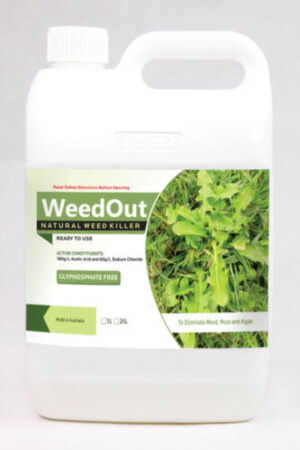
Weedout - No Glyphosate, Natural Organic WeedKiller
This organic, glyphosate-free weed killer is a great way to get rid of unwanted weeds in paving, flowerbeds, vegetable gardens and lawns without harming the environment.
Australian-made, it uses acetic acid and salt to deliver fast results, especially when applied on hot, sunny days. Wilting will usually occur within a couple of hours.
Pros
Cons
9. Brunnings Extra Strength Feed 'n Weed (Toxic)
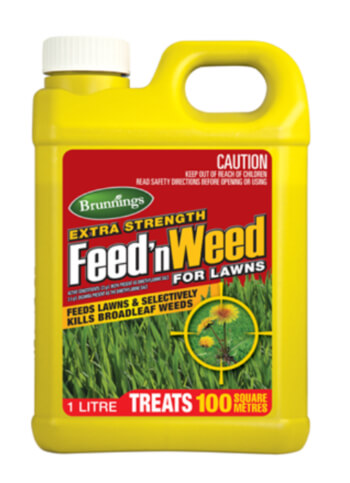
Brunnings Extra Strength Feed 'n Weed
If you like Brunnings Feed ‘n Weed but want something with a bit more power in a liquid form, this is a great option. It’s a selective weed killer that’s safe for most lawn types, killing off broadleaf weeds like clover, bindii, and dandelions without harming your grass.
The fertiliser component helps to nourish your lawn and boost growth, making it harder for weeds to grow.
Pros
Cons
Best Weed Killer Australia
Best Weed Killer - Our Top Choice


Source: amazon.com.au
Roundup Regular was always going to get our best weedkiller spot. It’s fast-acting and long-lasting and has been the world’s favourite weed killer brand for decades.
The spray bottle for the 3-litre option is a little heavy to carry, but it comes in different sizes. However, it’s worth noting that the larger tubs last longer, and are significantly better value than the 1 or 1.5-litre bottles.
Best Value Weed Killer


Source: amazon.com.au
The HOT Devil weed killer is a simple propane tank attached to a burner rod. There’s nothing particularly fancy about it, but it's purpose-built to make weed killing an easy task, and the bottles are interchangeable with most propane bottles from any DIY store.
Once the tank runs dry, just buy a budget replacement and you’re all set again.
Weed killer Frequently Asked Questions
What is the best weed killer?
Roundup has been the world’s bestselling weed killer for decades, and it is up there for a reason – it works. There are some long-lasting weeds that roundup won’t touch though, so if you’re not after organic options, try glyphosate.
If you’re trying your hand at organic gardening, the best thing is always, and will always be manual labour!
Will vinegar kill weeds?
The acetic acid in white vinegar does kill weeds, especially when mixed with warm water and dish soap. The soap helps the vinegar adhere to foliage, and also blocks the pores of plants.
The acetic acid dries out the foliage and increases stress on the roots. For some light weeds, this can kill them completely within 24 hours.
What is the strongest weed killer in Australia?
Roundup is one of the most effective and strongest weed killers you can buy in Australia. It does contain glyphosate, so is not safe for wildlife, but when used responsibly, it is one of the only weed killers that will kill weeds with a single application.
What is the best weed killer without killing grass?
Yates’ Bindii & Clover Weeder Up is perfect for killing tough weeds like Bindii and Clover in lawns without killing grass. It’s specifically formulated to kill weeds and feed grass, using a clever mix of systemic weed killers.
Use sparingly and according to the instructions to get the best coverage, and aim to repeat the treatment of any tough patches a few times.
What kills weeds permanently in Australia?
Glyphosate is the most effective over-the-counter weed killer you can buy in Australia and is included in many common weed killers. Burning weeds will kill most annual self-seeding weeds, but will simply delay flowering for most tap-rooted weeds or perennial weeds.
What kills weeds the fastest?
Boiling water and weed burners are the faster ways to kill weeds, but they are not long-lasting treatments. To quickly clean up the garden and remove weeds before guests arrive, just whip around with boiling water.
Lawns will quickly recover and the weeds are out of sight, and out of mind, at least for now!
Is salt a good weedkiller?
Using salt to kill weeds is pretty common, and works very well, but (and it’s a big but) it will also kill any other plants it touches, and can ruin soil if it washes off your paths to lawn edges or garden borders and beds. If you value your garden, avoid using salt as a weed killer.
What does soap do in weedkillers?
If your weedkiller has any type of soap, the main purpose is to aid adherence, and help it stick to the foliage of whatever you’re spraying. The soap creates a fine film over the leaf, preventing oxygen or carbon dioxide transfer (photosynthesis), and will actively support the effectiveness of the weed killer.
What time of day is best to use weedkiller?
Try not to use weedkillers in the morning as excessive moisture in the soil or in plants themselves will make the weedkiller less effective. Most herbicides rely on stressing plants, and healthy weeds are more resistant to that.
When should you not spray weeds?
Do not spray weeds if it’s going to rain. Rain will wash off weed killers, and contaminate your soil. Also, avoid using weed killers around children, pets, or in organic gardens where the chemical components generally do more harm than good.
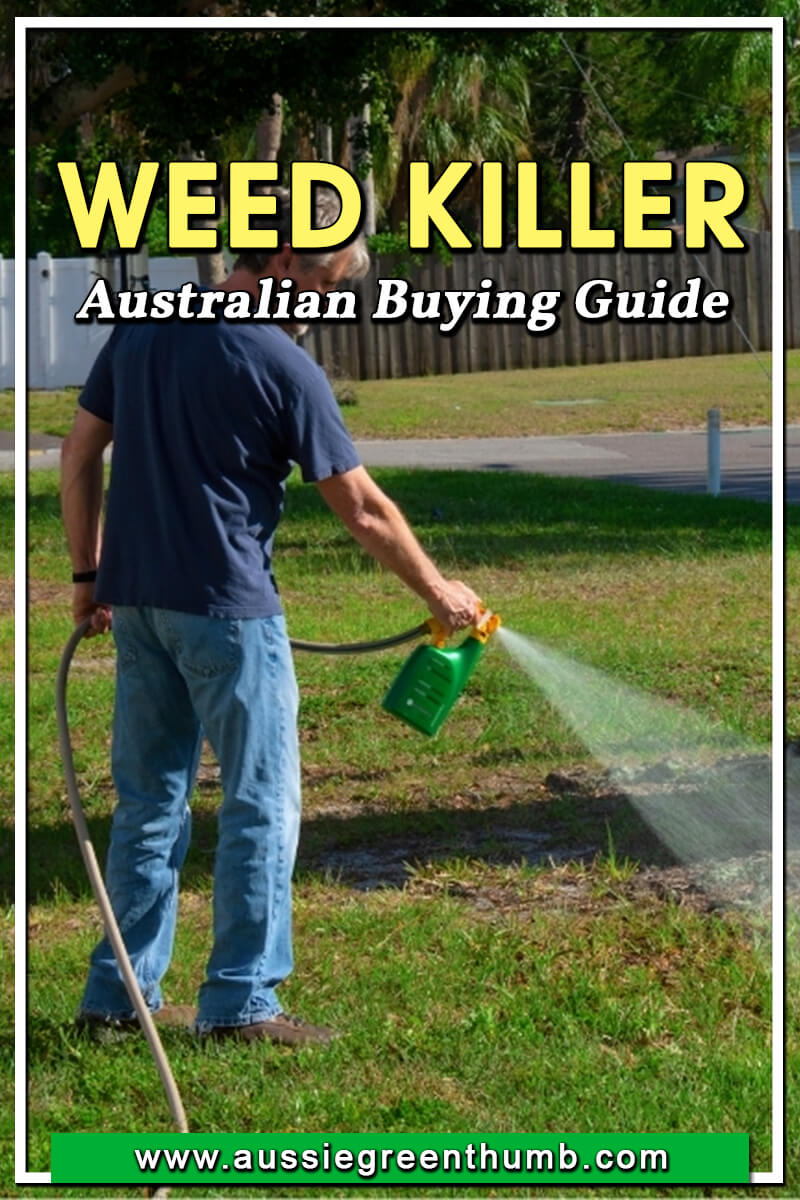
Enjoy a Weed-Free Garden with the Best Weed Killer in Australia
If you want a neat, beautiful, and weed-free garden, then you need the best methods for controlling annual and perennial weeds. We recommend trying out organic options first, as these are safe for the environment as well as your family and pets.
Whatever your weed killer, remember to apply it on a hot, sunny day when no rain or wind is forecast, and to take appropriate precautions especially when dealing with toxic chemicals.
We hope this article helped you find the best weed killer for your garden!
Published on December 24, 2022 by Gary Clarke
Last Updated on December 23, 2024




